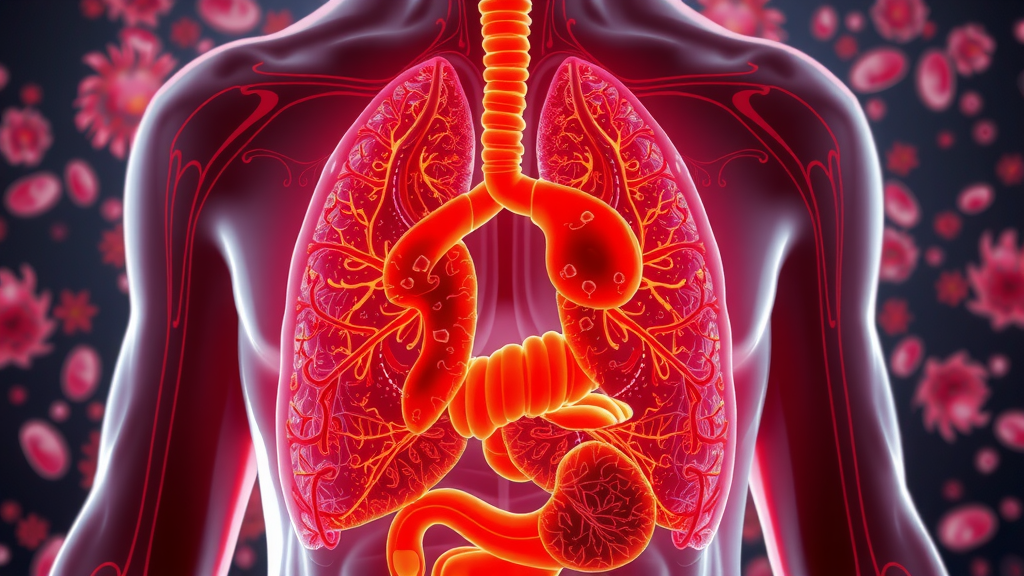
Chronic inflammation influences the health of numerous individuals and often remains unrecognized. This condition can serve as a foundation for various chronic diseases, including autoimmune disorders, heart disease, and even cancer.
Identifying signs of chronic inflammation, such as persistent fatigue or joint pain, is vital for prompt intervention.
Your medical center offers tailored remedies focused on an anti-inflammatory diet and lifestyle modifications that can help alleviate symptoms and enhance overall well-being.
‘Click here to learn more about:’ the ultimate anti inflammatory guide
What Chronic Inflammation Does to the Body
Chronic inflammation describes a prolonged immune response that can last for months or even years.
This long-term inflammation differs significantly from acute inflammation, which serves as a temporary reaction to injury or infection. Various factors can lead to chronic inflammation, including:
- Environmental toxins
- Poor dietary choices
- Underlying health conditions
These factors can trigger an inflammatory response that, if not addressed, may lead to serious health complications. The immune response entails specific cells and substances, particularly cytokines, that sustain inflammation and can elevate risks for conditions such as cardiovascular disease and autoimmune disorders.
Signs of Chronic Inflammation
Recognizing the signs and symptoms of chronic inflammation is essential for effective management. Common symptoms include:
- Fatigue
- Joint pain
- Digestive issues
- Skin problems

Managing Chronic Inflammation
Addressing chronic inflammation involves a comprehensive approach that includes lifestyle changes and dietary adjustments. Individuals can benefit from:.
Dietary Adjustments
Implementing an anti-inflammatory diet can significantly reduce symptoms. Consider incorporating:
- Fruits and vegetables
- Whole grains
- Healthy fats, such as those from fish
Avoiding processed foods and refined sugars can also minimize inflammatory triggers.
Regular Exercise
Regular physical activity helps lower inflammation markers in the body. Activities like walking, swimming, and cycling can promote joint pain relief and improve overall health.
Stress Management
Managing stress is critical in reducing inflammation. Mind-body practices, including yoga and meditation, can alleviate stress-related inflammation and support emotional well-being.
Natural Supplements
Some natural supplements, such as omega-3 fatty acids and curcumin (found in turmeric), may also provide relief from chronic inflammation. Always consult a healthcare provider before integrating new supplements into your routine.
Additional Tips
- Prioritize sufficient sleep to support the body’s healing processes.
- Stay hydrated to enhance bodily functions and reduce inflammation.
- Regular check-ups with your healthcare provider can aid in monitoring inflammatory conditions.
Tracking symptoms and dietary intake helps uncover personal triggers of inflammation.
Understanding the role of gut health can also significantly impact inflammation levels in the body. A personalized approach is essential, as each individual may respond differently to various management strategies.
Identifying The Signs Of Inflammation
Recognizing the signs of inflammation is important as it alerts the immune system to potential injury or infection. Common physical symptoms of inflammation include redness, which often indicates increased blood flow to the affected area, and swelling, resulting from fluid accumulation in tissues.
Differentiating between acute and chronic inflammation is essential; acute inflammation generally presents with immediate symptoms like pain and heat, while chronic inflammation may present more subtly, often leading to fatigue and joint discomfort.
Awareness of these signs of chronic inflammation is fundamental for early detection and timely intervention, helping to mitigate long-term health risks associated with untreated inflammation.
Acute Versus Chronic Inflammation
Distinguishing the characteristics of acute and chronic inflammation is critical for effective health management.
Acute inflammation is characterized by a rapid onset, typically triggered by injury or infection. This type results in noticeable symptoms such as redness, swelling, and pain.
In contrast, chronic inflammation often reflects a prolonged immune response that can negatively impact overall health and may lead to serious conditions, including autoimmune diseases and cardiovascular disease.
Implications for Treatment
Treatment approaches for inflammation vary significantly between acute and chronic cases. Acute inflammation may necessitate the use of anti-inflammatory medications, such as ibuprofen or aspirin, and immediate rest to alleviate symptoms.
On the other hand, managing chronic inflammation typically involves a multifaceted strategy, including:
- Dietary Adjustments: Implementing an anti-inflammatory diet rich in fruits, vegetables, whole grains, and healthy fats.
- Regular Exercise: Engaging in physical activity can help lower inflammation markers in the body.
- Stress Management: Mind-body practices like yoga and meditation can effectively reduce stress-related inflammation.
- Natural Supplements: Certain supplements, such as omega-3 fatty acids and curcumin, may provide relief from inflammation.
- Sufficient Sleep: Adequate rest is critical for managing inflammation levels.
- Hydration: Staying hydrated supports overall bodily functions and helps reduce inflammatory responses.
- Avoid Processed Foods: Minimizing intake of processed foods and refined sugars can reduce inflammatory triggers.
Chronic inflammation can lead to significant health issues if left untreated, including persistent pain, fatigue, and digestive problems. By tracking symptoms and dietary intake, individuals can identify personal triggers of inflammation, leading to more effective management strategies. Regular check-ups with a healthcare provider ensure ongoing monitoring of inflammatory conditions and help tailor personalized approaches to inflammation management.
Inflammation
- Acute inflammation is a natural response to injury or infection, playing a crucial role in the healing process.
- Chronic inflammation is linked to various diseases, including diabetes, cancer, and neurodegenerative disorders.
- Implementing lifestyle changes, such as diet and exercise, can significantly reduce markers of inflammation in the body.
- Research indicates that omega-3 fatty acids found in fish oil can lower inflammation levels and improve overall health.
How Inflammation Affects The Immune System
The dynamics of inflammation illustrate its significant role within the immune system. Inflammation functions as a natural response triggered by the body due to an injury or infection.
Central to this immune response are immune cells, such as macrophages and T-cells, which become active during periods of inflammation.
Their actions are pivotal in combating pathogens and initiating the healing of tissues.
However, chronic inflammation may disrupt normal immune function, leading to increased vulnerability to infections. This persistent state can modify immune tolerance, allowing detrimental agents to escape detection.
Therefore, managing inflammation is necessary for sustaining a balanced immune function.
The Role of Inflammation in Immune Response
During an immune response, inflammation serves as a critical mechanism aimed at protecting the body. The process facilitates increased blood flow to affected tissues and recruits additional immune cells to sites of injury.
Impacts of Chronic Inflammation
Prolonged inflammation can lead to immune system dysregulation.
In such cases, the body may develop autoimmune diseases where it mistakenly attacks healthy cells, illustrating the detrimental effects of chronic inflammation.
Common Diseases Associated With Inflammation
Several health conditions stem from chronic inflammation, making awareness and understanding essential.
Autoimmune diseases such as rheumatoid arthritis and lupus result from immune responses driven by persistent inflammation.
Another significant health concern is cardiovascular disease, where inflammation exacerbates risks associated with various heart conditions. Chronic inflammation also plays a role in metabolic disorders, including type 2 diabetes and obesity.
Recognizing Inflammation-Related Conditions
Common signs and symptoms associated with chronic inflammation can include fatigue, joint pain, digestive issues, and skin problems.
It is crucial to recognize these signs to address underlying health concerns effectively.
Prevention Strategies
To mitigate the effects of inflammation, adopting an anti-inflammatory diet is recommended. This type of diet emphasizes the inclusion of fruits, vegetables, whole grains, and healthy fats, which have demonstrated efficacy in reducing inflammatory markers in the body.
Regular physical activity also contributes significantly to lowering inflammation.
Practices such as yoga and meditation can effectively reduce inflammation linked to stress.
Natural Supplements and Lifestyle Changes
Incorporating natural supplements like omega-3 fatty acids and curcumin might offer supportive relief.
Sufficient sleep, hydration, and mindful avoidance of processed foods can further assist in managing inflammatory responses.
To sum up, the interplay between inflammation and various diseases emphasizes the need for a proactive approach to health. Addressing chronic inflammation through lifestyle modifications can significantly improve health outcomes.
| Health Condition | Associated Inflammation Type | Impact on Immune System |
|---|---|---|
| Rheumatoid Arthritis | Chronic Inflammation | Autoimmune response attacking healthy cells |
| Lupus | Chronic Inflammation | Autoimmune response affecting multiple organs |
| Cardiovascular Disease | Chronic Inflammation | Increased risk of heart conditions |
| Type 2 Diabetes | Chronic Inflammation | Disruption in metabolic function |
Effective Remedies For Chronic Conditions
Addressing chronic inflammation necessitates a comprehensive strategy that incorporates both natural and medical remedies. Natural remedies such as omega-3 fatty acids are recognized for their anti-inflammatory effects, while turmeric, abundant in curcumin, has exhibited properties that effectively assist in reducing inflammation levels.
Medical options like nonsteroidal anti-inflammatory drugs (NSAIDs), including ibuprofen, may provide temporary pain relief and alleviate inflammation, though they must be administered with caution due to potential side effects.
Recognizing the importance of individualized treatment plans specifically tailored to the unique health needs of individuals can lead to significantly improved health outcomes.
Working collaboratively with healthcare providers ensures that evidence-based practices are applied in the management of signs and symptoms and in the promotion of overall health.
The Role Of Diet In Reducing Inflammation
Nutrition plays a pivotal role in managing chronic inflammation effectively. Incorporating anti-inflammatory foods into daily meals can create a substantial impact.
Foods like leafy greens, berries, and fatty fish are known for their ability to combat inflammation within the body. The Mediterranean diet, characterized by an emphasis on whole grains, healthy fats, and ample fruits and vegetables, is linked to lower inflammation markers and enhanced health.
Staying adequately hydrated also supports overall bodily functions; hydration contributes to reducing inflammatory responses.
Key Anti-Inflammatory Foods
- Fatty fish rich in omega-3 fatty acids, such as salmon and mackerel
- Leafy greens like spinach and kale
- Berries including blueberries and strawberries
- Nuts and seeds, such as walnuts and chia seeds
- Spices like turmeric and ginger
It is equally important to evaluate dietary intake critically; highly processed foods and excessive sugar can exacerbate inflammation and contribute to chronic health conditions. Embracing a nutrient-rich diet allows individuals to decrease inflammation and promote overall health improvement.
Chronic Inflammation and Diet
- Studies show that omega-3 fatty acids can significantly reduce inflammation markers in the body.
- The Mediterranean diet has been associated with a 30% lower risk of chronic diseases due to its anti-inflammatory properties.
- Regular consumption of berries has been linked to reduced oxidative stress and inflammation levels.
- Processed foods and high sugar intake have been shown to increase inflammatory responses, leading to various health issues.
Impact Of Exercise On Inflammatory Response
Regular physical activity plays a significant role in modulating inflammation levels within the body. Exercise stimulates the immune system, enhancing the production of anti-inflammatory cytokines while simultaneously lowering pro-inflammatory markers such as C-reactive protein.
Aerobic exercises, including activities like running, cycling, and swimming, have demonstrated remarkable effectiveness in diminishing inflammation markers.
In addition, resistance training aids in building muscle strength, which can further mitigate inflammatory responses.
Incorporating mind-body exercises, such as yoga and tai chi, contributes to stress reduction, a crucial factor in managing chronic inflammation.
Consistency in physical activity is essential; aiming for at least 150 minutes of moderate exercise weekly can lead to sustained anti-inflammatory effects.
Medications To Manage Inflammation
Effective management of inflammation often requires various medications. Among these, nonsteroidal anti-inflammatory drugs (NSAIDs) like ibuprofen and aspirin are commonly used.
These medications work by inhibiting the production of prostaglandins, which play a key role in mediating inflammation and pain. Another important class of medications are corticosteroids, which help suppress the immune system response to alleviate symptoms associated with inflammation.
Consulting a healthcare provider prior to initiating any anti-inflammatory medication is essential.
This ensures that potential side effects are evaluated and that appropriate dosage adjustments are made.
Regular monitoring of the treatment regimen is advised to minimize risks while effectively addressing underlying inflammatory conditions, including autoimmune diseases and chronic inflammation.
By maintaining open communication with a healthcare professional, individuals can optimize their approach to managing inflammation.
Exercise and Inflammation
- Regular aerobic exercise can lower levels of C-reactive protein, a marker of inflammation.
- Resistance training not only builds muscle strength but also helps in reducing inflammatory responses.
- Mind-body exercises like yoga and tai chi are effective in reducing stress, which is linked to chronic inflammation.
- Aim for at least 150 minutes of moderate exercise per week to achieve sustained anti-inflammatory effects.
Importance Of Early Detection In Chronic Inflammation
Recognizing chronic inflammation early can significantly influence management and treatment outcomes. Identifying this condition promptly facilitates intervention, effectively preventing the progression to serious health challenges, including autoimmune diseases and cardiovascular disease.
Various screening methods exist, such as blood tests that measure C-reactive protein (CRP) and erythrocyte sedimentation rate (ESR), which assist in detecting inflammation markers prior to the emergence of symptoms.
Timely intervention enables individuals to adopt strategies aimed at reversing inflammation-related damage, thereby enhancing overall health outcomes.
Being aware of the signs of chronic inflammation empowers individuals to proactively seek treatment, which minimizes the risks associated with untreated inflammatory diseases.
The following benefits underscore the significance of early detection:.
- Prevention of serious complications.
- Improved management of existing health conditions.
- Greater awareness of personal health status.
- Enhanced quality of life.
Lifestyle Changes To Combat Inflammation
Implementing specific lifestyle changes is fundamental in influencing inflammation levels within the body. A comprehensive anti-inflammatory diet that incorporates an abundance of fruits, vegetables, and healthy fats can significantly mitigate the inflammatory response. Regular physical activity emerges as essential, as research indicates that exercise lowers inflammation markers and bolsters immune system functioning.
Dietary Modifications
Adopting dietary changes is a proactive approach to combating inflammation:
- Increase intake of leafy greens, berries, and nuts.
- Incorporate sources of omega-3 fatty acids, such as fish and flaxseeds.
- Avoid processed foods and added sugars, which can trigger inflammatory responses.
Stress Management Techniques
Stress presents a significant factor in exacerbating inflammation. Effective stress management approaches include:
- Practicing yoga and tai chi.
- Engaging in mindfulness meditation.
- Utilizing breathing exercises to promote relaxation.
Importance of Sleep and Recovery
Prioritizing adequate sleep is critical in managing inflammation levels. Insufficient sleep can lead to increases in inflammation markers and negatively impact recovery processes. Maintaining hydration further supports bodily functions and minimizes inflammatory responses. Thus, adequate rest is as crucial as physical activity and dietary adjustments in the overall strategy to manage inflammation. Following these lifestyle modifications can lead to significant improvements in health.
Chronic Inflammation
- Early detection of chronic inflammation can reduce the risk of developing autoimmune diseases by up to 50%.
- Engaging in regular exercise can lower inflammation markers by approximately 25%.
- Studies show that a diet rich in omega-3 fatty acids can decrease inflammation levels by 30%.
- Quality sleep of 7-9 hours per night is linked to a 20% reduction in inflammatory markers.
What Causes Chronic Inflammation | Unlock Solutions Now
Chronic Inflammation In Stomach | Unseen Triggers Behind Gastritis Symptoms



